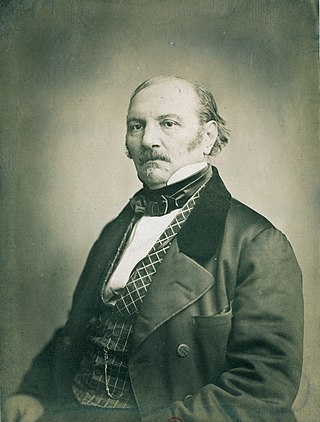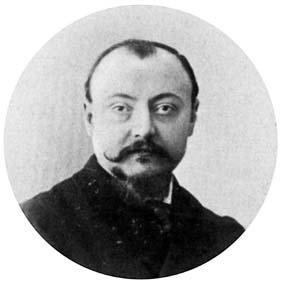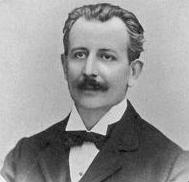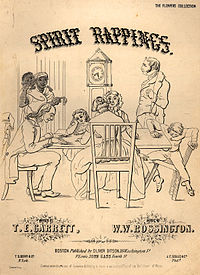
Allan Kardec is the pen name of the French educator, translator, and author Hippolyte Léon Denizard Rivail. He is the author of the five books known as the Spiritist Codification, and the founder of Spiritism.

Kardecist spiritism, also known as Spiritism or Kardecism, is a reincarnationist and spiritualist doctrine established in France in the mid-19th century by writer and educator Hippolyte Léon Denizard Rivail. Kardec considered his doctrine to derive from a Christian perspective. He described a cycle by which a spirit supposedly returns to material existence after the death of the body in which it had dwelled, as well as the evolution it undergoes during this process. Kardecism emerged as a new religious movement in tandem with spiritualism. The notions and practices associated with spiritual communication have been disseminated throughout North America and Europe since the 1850s.

Spiritualism is a social religious movement popular in the nineteenth and early twentieth centuries, according to which an individual's awareness persists after death and may be contacted by the living. The afterlife, or the "spirit world", is seen by spiritualists not as a static place, but as one in which spirits continue to interact and evolve. These two beliefs—that contact with spirits is possible, and that spirits are more advanced than humans—lead spiritualists to the belief that spirits are capable of advising the living on moral and ethical issues and the nature of God. Some spiritualists follow "spirit guides"—specific spirits relied upon for spiritual direction.

Charles Robert Richet was a French physiologist at the Collège de France and immunology pioneer. In 1913, he won the Nobel Prize in Physiology or Medicine "in recognition of his work on anaphylaxis". Richet devoted many years to the study of paranormal and spiritualist phenomena, coining the term "ectoplasm". He believed in the inferiority of black people, was a proponent of eugenics, and presided over the French Eugenics Society towards the end of his life. The Richet line of professorships of medical science continued through his son Charles and his grandson Gabriel. Gabriel Richet was also one of the pioneers of European nephrology.

Umbanda is a religion that emerged in Brazil during the 1920s. Deriving largely from Spiritism, it also combines elements from Afro-Brazilian traditions like Candomblé as well as Roman Catholicism. There is no central authority in control of Umbanda, which is organized around autonomous places of worship termed centros or terreiros, the followers of which are called Umbandistas.

Mediumship is the practice of purportedly mediating communication between familiar spirits or spirits of the dead and living human beings. Practitioners are known as "mediums" or "spirit mediums". There are different types of mediumship or spirit channelling, including séance tables, trance, and ouija. The practice is associated with spiritualism and spiritism. A similar New Age practice is known as channeling.
Obsession, also known as spirit obsession, is a technical term within the Spiritist belief and practice defined by the author Allan Kardec as the interference of a subjugating spirit with a weaker spirit. Although the term most commonly refers to the negative influence of the spirit of an evil deceased person on the mind or spirit of a living person, obsession can occur in either direction.
A Spiritist centre, also called Spiritist society or Spiritist house, is the basic unit of organisation of Spiritism, which is a distinct form of Spiritualism.

Léon Denis was a notable French spiritist philosopher, and, with Gabriel Delanne and Camille Flammarion, one of the principal exponents of spiritism after the death of Allan Kardec. Denis lectured throughout Europe at international conferences of spiritism and spiritualism, promoting the idea of survival of the soul after death and the implications of this for human relations. He is known as the apostle of French spiritism.

Spiritualism is a metaphysical belief that the world is made up of at least two fundamental substances, matter and spirit. This very broad metaphysical distinction is further developed into many and various forms by the inclusion of details about what spiritual entities exist such as a soul, the afterlife, spirits of the dead, deities and mediums; as well as details about the nature of the relationship between spirit and matter. It may also refer to the philosophy, doctrine, or religion pertaining to a spiritual aspect of existence.

Alexandr Nikolayevich Aksakov was a Russian writer, translator, journalist, editor, state official and psychic researcher, who is credited with having coined the term "telekinesis". While living in Germany with his wife and publishing his writings there, he began to spell his name as Alexander Aksakof to accommodate the German spelling style, and this is the name by which he is most known outside of Russia.

Gustav Geley was a French physician, psychical researcher and director of the Institute Metapsychique International from 1919 to 1924.

Astral City: A Spiritual Journey is a 2010 Brazilian drama film directed by Wagner de Assis, starring Renato Prieto. It is based on the book of the same name by the medium Francisco Cândido Xavier, and features a soundtrack composed by Philip Glass.

François Marie Gabriel Delanne was a notable French spiritist, psychical researcher, writer, and electrical engineer. He is best known for his book, "Le Phénomène spirite".
Aruanda or Aluanda is a concept present in Afro-Brazilian religions, especially in Umbanda, as well as in Brazilian Spiritism. It describes a place in the spirit world, which varies greatly according to the religious current, but which could generally be equated with a kind of spiritual colony.
Lucie Anne Grange was a French medium and feminist prophet, her mystic name being Habimélah. She was the founder and editor of a monthly spiritualist journal, La Lumière.

Kardecist spiritism is the main form of Spiritualism in Brazil. Following the emergence of modern Spiritualist events in Hydesville, New York, United States, via the mediumship of the Fox sisters (1848), the phenomena quickly spread to Europe where, in France, the so-called "turning tables" became a popular fad. In France, this type of phenomenon, in 1855, caught the attention of the educator Hippolyte Léon Denizard Rivail. As a result of his research, he published the first edition of The Spirits' Book, under the pseudonym "Allan Kardec". The foundation of the Spiritist doctrine is contained in this book and four others published later: The Mediums' Book, 1861; The Gospel According to Spiritism, 1864; Heaven and Hell, 1865; The Genesis According to Spiritism, 1868. These combined books are called the "Kardecist Pentateuch".

Denominated basic works of Spiritism, also referred to as Codificação Espírita, are five books published by the French educator Hippolyte Léon Denizard Rivail under the pseudonym Allan Kardec, between 1857 and 1868. The Basic Works are part of the Fundamental Works of Spiritist Doctrine, which comprise 11 publications by Allan Kardec.

The Brazilian Spiritist Federation (FEB), founded in 1884, is a public utility body that constitutes the most important and influential representative organization of Spiritism in Brazil and in nearly all countries where the Spiritist movement is present.

For Spiritism, Jesus is the most perfect model of a human being that God has offered to serve as a guide. In this sense, Allan Kardec states that, "for humankind, Jesus constitutes the type of moral perfection that Humanity can aspire to on Earth. God offers him to us as the most perfect model, and the doctrine he taught is the purest expression of the Lord's law because, being the most spiritually pure of all those who have appeared on Earth, he was animated by the Divine Spirit".



















